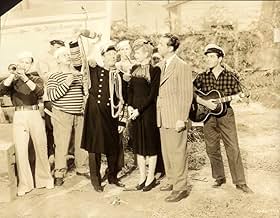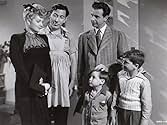An idealistic shipyard worker interests a beautiful Hollywood star in staging a musical tribute to the war industry, but they disagree on some important issues.An idealistic shipyard worker interests a beautiful Hollywood star in staging a musical tribute to the war industry, but they disagree on some important issues.An idealistic shipyard worker interests a beautiful Hollywood star in staging a musical tribute to the war industry, but they disagree on some important issues.
Rags Ragland
- Mr. Smith
- (as "Rags" Ragland)
Steven Geray
- Uncle Felix
- (as Steve Geray)
Harry Adams
- Shipyard Executive
- (uncredited)
Storyline
Did you know
- TriviaDaws Butler, the voice actor for Hanna-Barbera cartoon characters, patterned the voice of the lion Snagglepuss after Bert Lahr, who played the Cowardly Lion in The Wizard of Oz (1939). Butler took Snagglepuss's catchphrase "Heavens to Mergatroid" from Lahr's having said it in this movie.
- GoofsDirector Charles Reisner's name was incorrectly spelled in the main credits as "Riesner".
- Quotes
The Commander: You must come up and launch with me sometime.
- ConnectionsFeatured in The Big Parade of Comedy (1964)
- SoundtracksMeet the People
(1940)
Music by Jay Gorney
Lyrics by Henry Myers
Played during the opening credits
Sung by Dick Powell and chorus in his daydream
Reprised by Lucille Ball (dubbed by Gloria Grafton) and chorus at dress rehearsal
Sung by a chorus at the end
Featured review
The movies I choose to watch are sometimes suggested by events. Recently. I encountered yet another incomprehensible act by the American War Department and took refuge in this.
It is from an era of justified involvement in a war. Death camps, master race.
It is rank propaganda, subsidized by political leaders. It has other offenses. Blacks are shown twice: a man as a yassa porter and women happily picking cotton.
And yet its charm is in the thing it celebrates. You likely will never see this. It is dated and not very good as a film. The strings it pulls... well, they're broken. So let me describe it.
It features Lucille Ball before she made herself a joke. In this era, she was a desirable pinup, even at 33. She parades her legs and glamor as a famous stage actress. She meets and falls in love with a wartime shipworker who aspires to be a playwright. He, it turns out, has written a play featuring the good souls of the shipyard representing all the "ordinary people" of America who labored for the war effort, which at root was a competition of manufacturing infrastructures.
That play is the device around which all sorts of narrative effects are folded. There's the bit which forms the plot: she likes the play and attempts to put it on. But it gets too glamorized for the author. It isn't "real" enough and rather than demean the subject, he forgoes wealth and fame and closes it down. She follows him back to work in the shipyard to charm him into letting the show go on. As scripted, she discovers and comes to appreciate the goodness of the honestly laboring people.
At the end, she puts on the play as he intended it to be, at the shipyard. Inside the play's performance, he literally enters the play and reconciles with our girl. End of story.
Along the way, there are an amazing number of other excuses pulled to have song and dance numbers. Its purpose, after all was to mix entertainment and "the message."
So you have:
lunchtime shows at the shipyard (with Spike Jones and Hitler played by a chimp). Also, an evening show with several elaborate numbers.
a love song when the two go on their first date, the song half him demonstrating the song to her and half wooing her in the story by song.
a bit as if the movie were a musical comedy. In this case, the story itself bends into comic song as Burt Lahr's character christens his boat.
imitations of famous war leaders, performed randomly whenever a certain character appears. Some of these are unrecognizable today.
And that's in addition to seeing bits of the title show in New York and the shipyard.
A lot of entertainment. All the shows, every one, are miniature versions of the larger movie: celebrations of ordinary folk and then American values.
Ted's Evaluation -- 2 of 3: Has some interesting elements.
It is from an era of justified involvement in a war. Death camps, master race.
It is rank propaganda, subsidized by political leaders. It has other offenses. Blacks are shown twice: a man as a yassa porter and women happily picking cotton.
And yet its charm is in the thing it celebrates. You likely will never see this. It is dated and not very good as a film. The strings it pulls... well, they're broken. So let me describe it.
It features Lucille Ball before she made herself a joke. In this era, she was a desirable pinup, even at 33. She parades her legs and glamor as a famous stage actress. She meets and falls in love with a wartime shipworker who aspires to be a playwright. He, it turns out, has written a play featuring the good souls of the shipyard representing all the "ordinary people" of America who labored for the war effort, which at root was a competition of manufacturing infrastructures.
That play is the device around which all sorts of narrative effects are folded. There's the bit which forms the plot: she likes the play and attempts to put it on. But it gets too glamorized for the author. It isn't "real" enough and rather than demean the subject, he forgoes wealth and fame and closes it down. She follows him back to work in the shipyard to charm him into letting the show go on. As scripted, she discovers and comes to appreciate the goodness of the honestly laboring people.
At the end, she puts on the play as he intended it to be, at the shipyard. Inside the play's performance, he literally enters the play and reconciles with our girl. End of story.
Along the way, there are an amazing number of other excuses pulled to have song and dance numbers. Its purpose, after all was to mix entertainment and "the message."
So you have:
lunchtime shows at the shipyard (with Spike Jones and Hitler played by a chimp). Also, an evening show with several elaborate numbers.
a love song when the two go on their first date, the song half him demonstrating the song to her and half wooing her in the story by song.
a bit as if the movie were a musical comedy. In this case, the story itself bends into comic song as Burt Lahr's character christens his boat.
imitations of famous war leaders, performed randomly whenever a certain character appears. Some of these are unrecognizable today.
And that's in addition to seeing bits of the title show in New York and the shipyard.
A lot of entertainment. All the shows, every one, are miniature versions of the larger movie: celebrations of ordinary folk and then American values.
Ted's Evaluation -- 2 of 3: Has some interesting elements.
- How long is Meet the People?Powered by Alexa
Details
Box office
- Budget
- $1,302,000 (estimated)
- Runtime1 hour 40 minutes
- Color
- Aspect ratio
- 1.37 : 1
Contribute to this page
Suggest an edit or add missing content






















